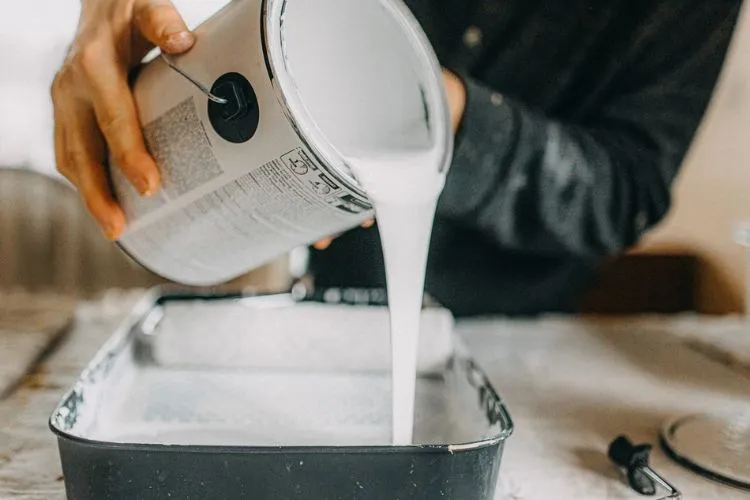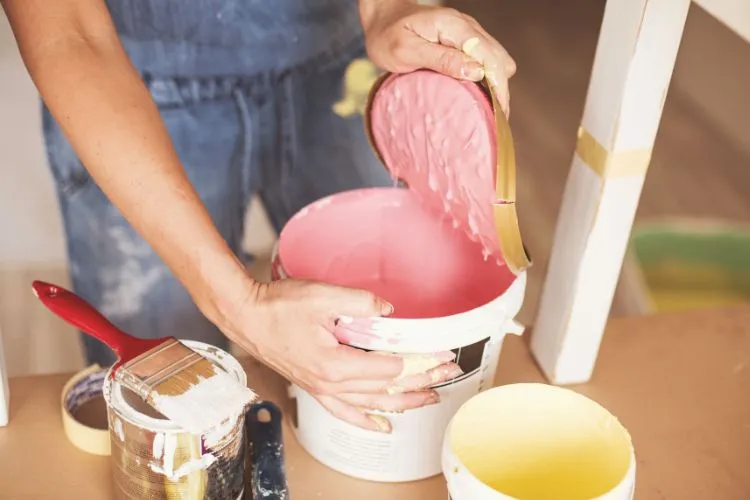Discovering your acrylic paint smells like rotten eggs can be a perplexing and unpleasant surprise.
This article delves into why my acrylic paint smells like rotten eggs and how you can address and prevent it, ensuring a safer and more enjoyable painting experience.

Why My Acrylic Paint Smells Like Rotten Eggs?
Chemical Composition of Acrylic Paints
Acrylic paints are favored by artists for their versatility and vibrant colors. They comprise pigments, an acrylic polymer emulsion, and various additives.
These components typically do not emit strong odors. However, certain circumstances can lead to unpleasant smells.
What Causes the Rotten Egg Smell?
The rotten egg smell in acrylic paint can stem from hydrogen sulfide or other sulfur compounds. These compounds may be present in some additives.
Additionally, bacterial contamination can produce such sulfurous odors. Understanding these factors is crucial in addressing and preventing the smell.
Factors Contributing to the Smell

Poor Storage Conditions
Bacteria thrive in warm and humid environments. If acrylic paints are stored poorly, under such conditions, bacterial growth can occur, leading to odors.
Proper storage of paints is essential. Keep them in a cool, dry place away from direct sunlight to prevent the development of smells.
Old or Expired Paint
Acrylic paint does not last forever. Over time, the likelihood of bacterial growth increases, especially if the paint container has been opened. Always check the expiration date on your paint and aim to use it within this period.
Contaminated Tools or Surfaces
Using brushes or canvases that were previously contaminated can transfer bacteria to your paint. Ensure all tools and surfaces are clean before starting your project.
Health Impacts
While the smell itself may not be harmful, certain individuals could experience adverse effects from the compounds responsible for the odor or from bacterial exposure.
If you notice any health changes while using smelly paint, it’s advisable to stop using it and seek medical advice.
You may also read: Can You Sublimate On Acrylic? Easy Guide
How to Address the Issue?

Immediate Steps
If your paint smells like rotten eggs, ventilate the area well. Dispose of the contaminated paint in a responsible manner.
Be sure to follow local guidelines for the disposal of chemical products.
Preventive Measures
To prevent odors, clean your painting tools and surfaces regularly. Buying paint in quantities you can use before it expires also helps. This reduces the chance of paint going bad and emitting unpleasant smells.
Choosing Quality Paints
Investing in high-quality acrylic paints with minimal additives can decrease the risk of encountering odors. Quality paints may have fewer ingredients that can turn foul over time.
Professional Tips
Experienced artists recommend always testing your paint for smells before use, especially if it has been stored for a while.
They also emphasize maintaining a clean workspace. Cleaning and disinfecting your tools regularly can prevent bacterial contamination.
Alternatives to Traditional Acrylic Paints
Alternatives to traditional acrylic paints, such as water-based acrylics and eco-friendly, non-toxic options, offer artists a viable solution to avoiding unpleasant smells often associated with conventional paints.
These alternatives are formulated to minimize or eliminate the volatile organic compounds (VOCs) that contribute to strong odors, making them a healthier choice for both the indoor environment and the artist’s well-being.
Water-based acrylics, in particular, boast a lower odor profile while providing the same versatility and durability as traditional acrylics.
Choosing eco-friendly paints not only reduces exposure to harmful chemicals but also supports environmental sustainability by using ingredients that are less damaging to ecosystems.
Furthermore, these paints often come in recyclable or biodegradable packaging, reinforcing the artist’s commitment to a healthier planet.
By selecting these alternative paints, artists not only benefit from a more pleasant working atmosphere but also contribute positively to environmental conservation efforts.
Understanding Expiration Dates

Understanding the expiration dates on paint products is crucial for artists to maintain the safety and quality of their work. These dates indicate the timeframe within which the manufacturer guarantees the product’s optimal performance and safety.
After the expiration, paints may not only lose their vibrancy and consistent texture but could also pose health risks due to the potential development of harmful bacteria or chemical degradation.
Artists should regularly check their supplies and organize them based on these dates to prioritize the use of older paints.
Moreover, respecting expiration dates helps in avoiding the frustration of working with paint that no longer behaves as expected, ensuring that artwork remains true to the artist’s vision.
Proper management of paint supplies, guided by awareness of expiration dates, is essential for maintaining the integrity of the creative process, ensuring both the physical well-being of the artist and the aesthetic quality of their work.
Frequently Asked Questions (FAQs)
Is it safe to use acrylic paint that smells like rotten eggs?
It’s best to avoid using paint that emits a strong rotten egg smell. This could indicate bacterial contamination or the presence of harmful compounds.
Can the smell of rotten eggs from paint affect my health?
In some cases, yes. If you experience any health issues when exposed to the smell, discontinue use and consult a healthcare provider.
How can I tell if my acrylic paint is contaminated?
A strong, unpleasant odor is a clear sign. Also, look for any unusual changes in the texture or color of the paint.
Are there any natural remedies to remove the smell from contaminated paint?
Once paint is contaminated, it’s difficult to remove the smell. It’s safer to dispose of it and use a fresh supply.
Do all acrylic paints have an expiration date?
Most acrylic paints have an expiration date indicated on the packaging. It’s crucial to use them within this timeframe to avoid issues, including bad odors.
Conclusion:
The presence of a rotten egg smell in your acrylic paint is usually due to sulfur compounds or bacterial contamination.
By understanding the causes and taking steps to prevent them, you can ensure a safer and more pleasant painting experience. Remember, proper storage, using fresh paints, and maintaining clean tools and surfaces are key.
By adhering to these guidelines and taking proactive steps, you can continue to enjoy painting with acrylics, without the worry of unexpected and unpleasant surprises like the smell of rotten eggs.

Meet Isabella Anderson, your acrylic painting mentor with over a decade of brush-wielding mastery. Dive into the colorful world of acrylics with her expert guidance, featured exclusively on ‘Acrylic Authority.’ Unleash your inner artist and explore the limitless possibilities of this versatile medium alongside a true acrylic aficionado.
